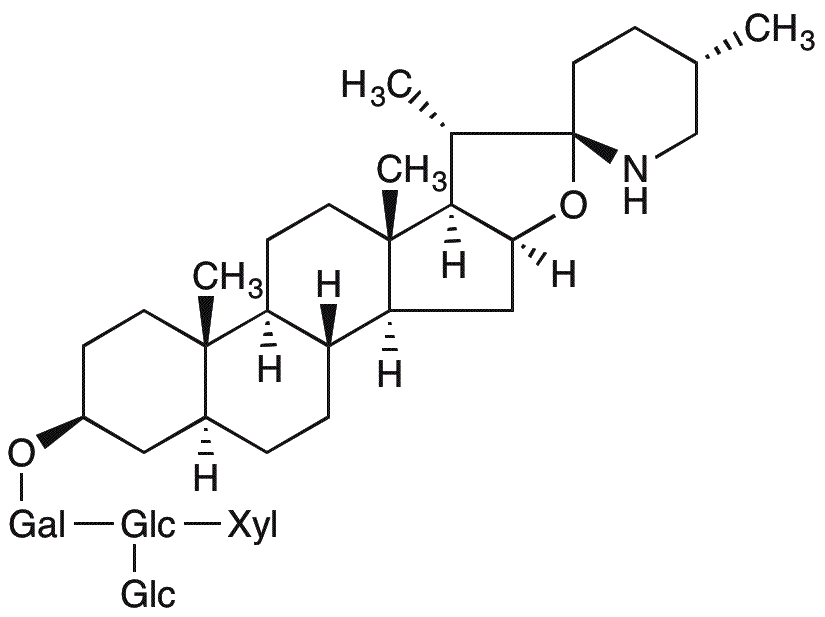Tomatine from Tomato is widely utilized in research focused on:
- Antimicrobial Applications: Tomatine exhibits natural antimicrobial properties, making it valuable in developing food preservatives and natural disinfectants. Its effectiveness against various pathogens can help enhance food safety.
- Pharmaceutical Development: Researchers are exploring tomatine's potential in drug formulation, particularly for its anti-inflammatory and anti-cancer properties. This could lead to innovative treatments in the pharmaceutical industry.
- Plant Protection: As a natural pesticide, tomatine can be used in agriculture to protect crops from pests and diseases. Its application promotes sustainable farming practices and reduces reliance on synthetic chemicals.
- Functional Foods: The health benefits of tomatine are being studied for incorporation into functional foods and dietary supplements. This can cater to health-conscious consumers looking for natural ways to enhance their diets.
- Cosmetic Industry: Due to its antioxidant properties, tomatine is being investigated for use in skincare products. It may help in formulating creams and serums that protect the skin from oxidative stress.
General Information
Properties
Safety and Regulations
Applications
Tomatine from Tomato is widely utilized in research focused on:
- Antimicrobial Applications: Tomatine exhibits natural antimicrobial properties, making it valuable in developing food preservatives and natural disinfectants. Its effectiveness against various pathogens can help enhance food safety.
- Pharmaceutical Development: Researchers are exploring tomatine's potential in drug formulation, particularly for its anti-inflammatory and anti-cancer properties. This could lead to innovative treatments in the pharmaceutical industry.
- Plant Protection: As a natural pesticide, tomatine can be used in agriculture to protect crops from pests and diseases. Its application promotes sustainable farming practices and reduces reliance on synthetic chemicals.
- Functional Foods: The health benefits of tomatine are being studied for incorporation into functional foods and dietary supplements. This can cater to health-conscious consumers looking for natural ways to enhance their diets.
- Cosmetic Industry: Due to its antioxidant properties, tomatine is being investigated for use in skincare products. It may help in formulating creams and serums that protect the skin from oxidative stress.
Documents
Safety Data Sheets (SDS)
The SDS provides comprehensive safety information on handling, storage, and disposal of the product.
Product Specification (PS)
The PS provides a comprehensive breakdown of the product’s properties, including chemical composition, physical state, purity, and storage requirements. It also details acceptable quality ranges and the product's intended applications.
Certificates of Analysis (COA)
Search for Certificates of Analysis (COA) by entering the products Lot Number. Lot and Batch Numbers can be found on a product’s label following the words ‘Lot’ or ‘Batch’.
*Catalog Number
*Lot Number
Certificates Of Origin (COO)
This COO confirms the country where the product was manufactured, and also details the materials and components used in it and whether it is derived from natural, synthetic, or other specific sources. This certificate may be required for customs, trade, and regulatory compliance.
*Catalog Number
*Lot Number
Safety Data Sheets (SDS)
The SDS provides comprehensive safety information on handling, storage, and disposal of the product.
DownloadProduct Specification (PS)
The PS provides a comprehensive breakdown of the product’s properties, including chemical composition, physical state, purity, and storage requirements. It also details acceptable quality ranges and the product's intended applications.
DownloadCertificates of Analysis (COA)
Search for Certificates of Analysis (COA) by entering the products Lot Number. Lot and Batch Numbers can be found on a product’s label following the words ‘Lot’ or ‘Batch’.
*Catalog Number
*Lot Number
Certificates Of Origin (COO)
This COO confirms the country where the product was manufactured, and also details the materials and components used in it and whether it is derived from natural, synthetic, or other specific sources. This certificate may be required for customs, trade, and regulatory compliance.


